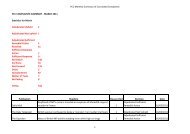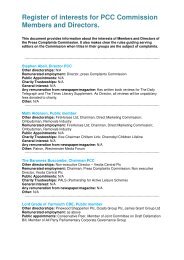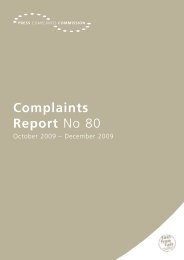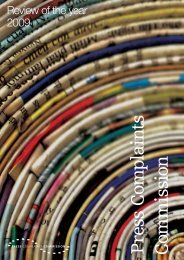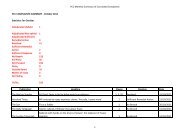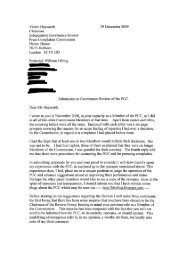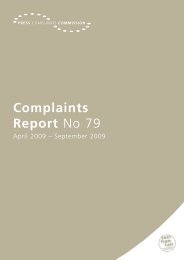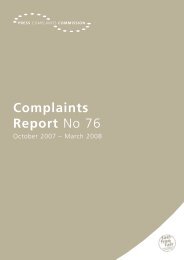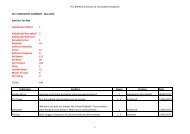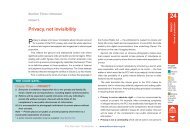2008 - Press Complaints Commission
2008 - Press Complaints Commission
2008 - Press Complaints Commission
You also want an ePaper? Increase the reach of your titles
YUMPU automatically turns print PDFs into web optimized ePapers that Google loves.
International<br />
report<br />
The Alliance of Independent <strong>Press</strong> Councils of Europe (AIPCE) provides a link<br />
between press councils and press complaints commissions throughout Europe.<br />
There has been considerable growth<br />
in the number of self-regulatory<br />
press and media councils around<br />
the world in recent years. This has largely<br />
been the result of a desire to strike a<br />
balance between freedom and<br />
responsibility. All members of AIPCE are<br />
opposed to the harmonisation of media<br />
regulation across borders. One of its<br />
founding principles was: “that media<br />
content regulation… should be based on<br />
nations’ differing cultures”.<br />
This seems like common sense.<br />
Pan-European regulation, even aside from<br />
practical problems, would be inappropriate<br />
given the the divergent social, cultural and<br />
political outlooks of Europe's many<br />
countries. However, a standardised Code<br />
of Practice or single European press council<br />
is said to be on the agenda of some policymakers<br />
and academics. This will be resisted<br />
by the PCC and its partners.<br />
In <strong>2008</strong>, a new website was<br />
launched (www.aipce.net) which explains<br />
the role of the Alliance and includes<br />
contact details of its members.<br />
AIPCE’s annual conference was<br />
hosted by the Deutscher <strong>Press</strong>erat and<br />
attended by representatives from over<br />
twenty countries. Delegates discussed the<br />
importance of accountability and the<br />
challenges of dealing with internet<br />
content. The Alliance also backed ongoing<br />
efforts towards establishing self-regulatory<br />
systems in France and Hungary.<br />
The PCC has always sought to<br />
foster a spirit of co-operation with press<br />
councils outside Europe, sharing<br />
experiences and advice. Last year we<br />
participated in events to promote media<br />
self-regulation in Sri Lanka, Spain and<br />
Canada (where separate, provincial<br />
press councils are seeking closer<br />
co-operation in response to the<br />
changing media landscape).<br />
We also hosted numerous guests<br />
at the PCC's offices: representatives from<br />
the press councils of Malawi, Alberta<br />
and Norway; journalists and students<br />
from many countries including Russia<br />
and the United States; and various political<br />
delegations, including from China and<br />
Iran. All came to learn more about the<br />
practical workings of self-regulation.<br />
C A S E S T U D Y<br />
Failure to include denial<br />
of serious allegations<br />
PAUL BURRELL complained about an article headlined<br />
“Burrell: I had sex with Diana”, which was largely based on his<br />
brother-in-law’s recollection of a conversation he had allegedly had<br />
in 1993, in which Mr Burrell was said to have boasted of having<br />
sex with Princess Diana.<br />
The <strong>Commission</strong> was asked whether it was acceptable for<br />
the newspaper to have run the story without going to Mr Burrell<br />
for comment. The newspaper said it thought that Mr Burrell could<br />
not be trusted and was concerned about him obtaining an<br />
undeserved injunction.<br />
We agreed with the complainant. Since the claims were<br />
substantial, published with great prominence, and were based on<br />
the recollection of a fifteen-year-old conversation, the newspaper<br />
should have run Mr Burrell’s denial in the story or made a prompt<br />
and proportionate offer to do so soon after. The <strong>Commission</strong> said<br />
there was a strong likelihood that the omission of any denial from<br />
Mr Burrell may have misled readers into believing that he accepted<br />
the allegations.<br />
LESSON There has never been a requirement for<br />
newspapers to contact those about to feature in<br />
articles. However, failure to include a denial of serious<br />
allegations may cause readers to be misled. It will<br />
depend on the nature of the claims and how much<br />
evidence there is to support them. Concerns about<br />
undeserved injunctions are not an excuse.<br />
D A V I D C H I P P<br />
It was with great sadness that we learned of the death of David Chipp in September <strong>2008</strong> at the age of 81. David had enjoyed a successful<br />
journalistic career with Reuters and PA, and was a founding member of the PCC. After retirement and until his death, he continued to<br />
advise the PCC in his role as international consultant. He was well known and hugely admired by those involved in self-regulation across<br />
the world, and had been a key figure at the meeting in Amsterdam in 1998 that ultimately led to the formation of AIPCE.<br />
32 33




